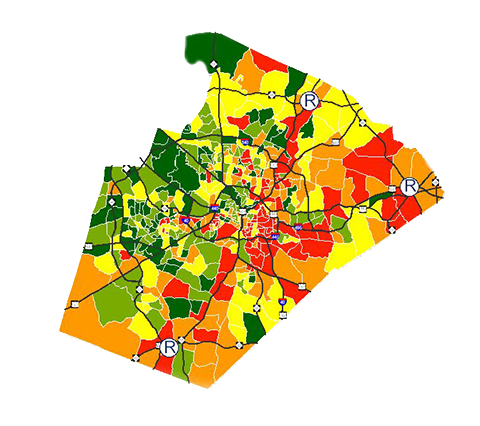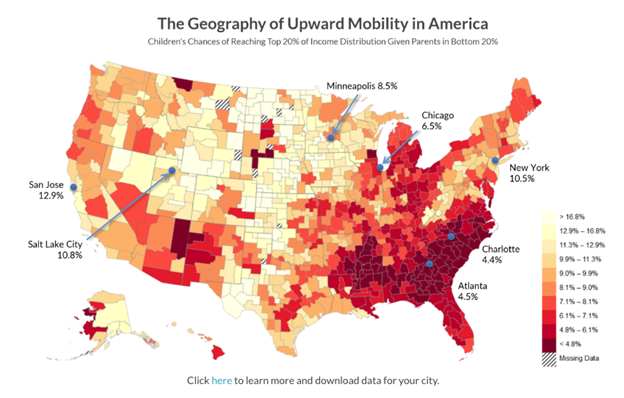By Torri Staton, PhD
Director of Equitable Economic Development, Wake County Economic Development
Vice President of of Diversity, Equity & Inclusivity, Greater Raleigh Chamber
In 2023, the Triangle DEI Alliance and Wake County Economic Development, programs of the Greater Raleigh Chamber, piloted a collaboration with Economic Leadership, LLC for a unique purpose: How do we measure economic mobility success in a metro area?
The great city of Raleigh, North Carolina – centrally located, beautifully landscaped, and bursting with economic opportunity is also rich with culture. As Raleigh and surrounding Wake County grows exponentially, how is it able to gauge Economic Mobility?
WCED and Wake County ha ve previously created measures to understand whether vulnerable populations can access the benefits of economic growth and prosperity. Years ago, in partnership with RTI, a vulnerable communities heatmap was created using measures like educational attainment, dependency ratio, locations of vacant housing, and income. This index found that vulnerable populations were concentrated in specific areas in Wake County, including Southeast Raleigh. The areas designated as vulnerable were also areas where a significant amount of Wake County’s Black and Brown populations are concentrated.
ve previously created measures to understand whether vulnerable populations can access the benefits of economic growth and prosperity. Years ago, in partnership with RTI, a vulnerable communities heatmap was created using measures like educational attainment, dependency ratio, locations of vacant housing, and income. This index found that vulnerable populations were concentrated in specific areas in Wake County, including Southeast Raleigh. The areas designated as vulnerable were also areas where a significant amount of Wake County’s Black and Brown populations are concentrated.
WCED focused on these areas as targeted growth areas for equitable economic development – ensuring that businesses in these areas had access to tools and resources to take advantage of the economic boom Raleigh has been experiencing. While additional data shows that the southeastern region of the US, where North Carolina is located, has a significant amount of the US’s Black American population, the southeastern US is also among the least upwardly mobile regions in the US.

This heatmap has guided WCED’s equitable economic development practices since 2017 and was one of the catalysts for the creation of the Triangle Diversity, Equity, and Inclusivity Alliance, a program of the Raleigh Chamber. The “A Better Wake” Initiative, including the Blueprint, which seeks to understand the race equity needs of Wake County, also shows Economic Mobility to be a major focus area to improve the experiences of Black and Brown Wake County residents.
As the Economic Mobility Index was created and analyzed – it was clear that Raleigh had many strengths including educational attainment, access to healthcare, and percentage of women-owned businesses in the area. Some areas of growth, however, were inequities regarding income, employment, and home ownership – all imperative pathways to wealth and economic mobility.
This index is essential to learning and understanding the needs of vulnerable populations in the Raleigh Metro, the areas of growth to ensure equity in the region, and the steps needed to ensure everyone has access to the economic growth happening in the region. This site also includes a Prezi that summarizes the Index, a conversation with the creators of the Index, and blog posts from partners at the City of Raleigh, Raleigh Economic Development, Wake County Government Division of Race Equity, and Economic Leadership, LLC with implications of the data. Thank you for engaging with the Economic Mobility Index and for your support of the Triangle Diversity, Equity, and Inclusivity Alliance and Wake County Economic Development!
To learn more about the “A Better Wake” Initiative, click here.
To read the Blueprint to Dismantle Systemic Racism and see additional information, click here.
To learn more about Equitable Economic Development, click here.
Comments
There are no comments yet.
Leave a Comment